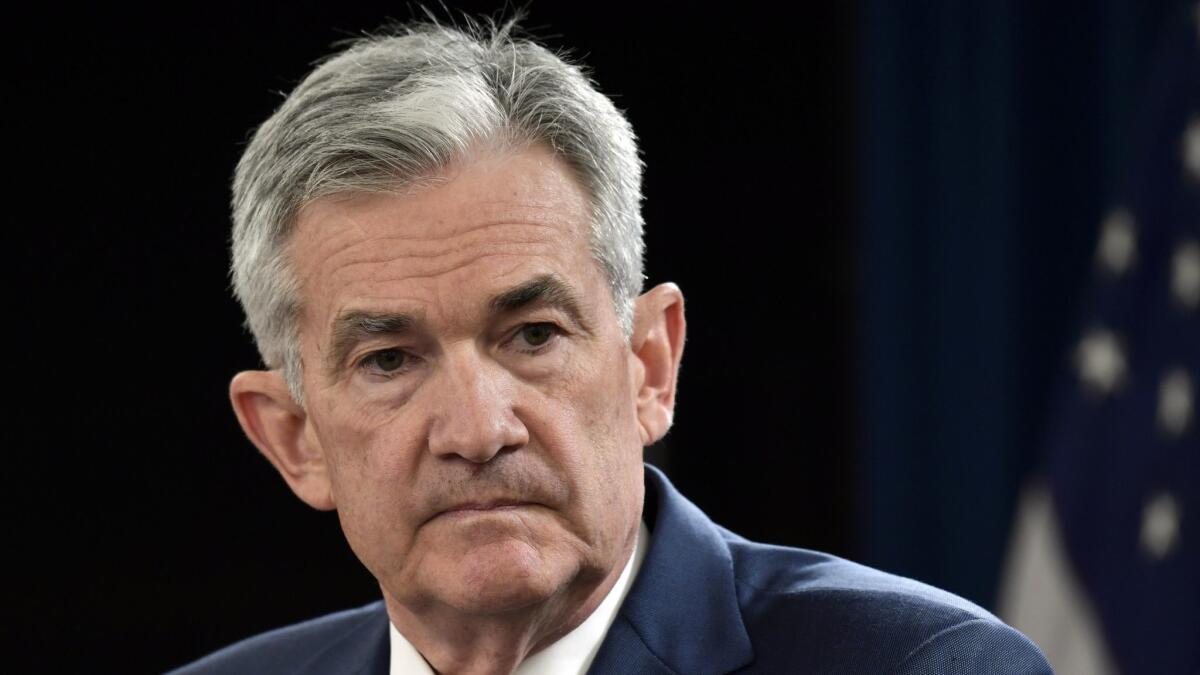Traders bet that central banks won’t keep calm over the virus for long

- Share via
Investors aren’t buying the idea that central banks’ wait-and-see approach to the coronavirus will last. They’re betting on interest-rate cuts that could start within months.
Money markets now see three Federal Reserve reductions this year — starting in March — and one by the European Central Bank in July. The Bank of England will cut in May, according to a similar metric.
The ECB is in a tougher position than other central banks, with limited ammunition if the situation worsens, and top officials including President Christine Lagarde have signaled that more time is needed to weigh the impact of the outbreak.
But even for those with more space, such as the Fed, there are doubts that monetary policy response will prove effective, as the virus-induced shock is concentrated on the supply side of the economy.
“The problem with doing monetary stimulus is that it will have limited impact on the effects of the virus,” said Jens Peter Sorensen, chief analyst at Danske Bank A/S, in Copenhagen. “The COVID-19 virus is keeping people from work, the supply chain is disrupted and tourists are not going to Italy. Monetary policy can do very little.”
So far, the view among central bankers across the world is it’s too early to assess what the economic damage will be.
Bank of Korea Gov. Lee Ju-yeol said the appropriate response at this stage was targeted support for the companies most affected by the biggest virus outbreak outside China, not a wider-reaching rate reduction.
Bank of England’s outgoing Gov. Mark Carney warned that the coronavirus could result in an economic growth downgrade for the U.K., Sky News reported. The governor of the Bank of France, Francois Villeroy de Galhau, said that the virus is a supply shock and monetary policy may not be the right response, and ECB Executive Board member Isabel Schnabel said they need more clarity about the implications of the virus, echoing Fed Vice Chairman Richard Clarida’s statement this week.
“They would prefer not to rush to judgment and stay on hold for now,” Roberto Perli, a partner at Cornerstone Macro LLC in Washington, said of the Fed. The likely outcome is “they don’t cut in March but issue a statement that makes it clear they are ready to act if the situation deteriorates.”
Meanwhile, investors are buying up haven investments, sending yields on U.S. Treasuries to record lows and putting the dollar on course for its best month since July. And volatility has returned to the currency market, with demand for protection against price swings in the euro jumping, a sign that traders’ clearest expectation is for turbulence rather than direction.
While policy makers don’t want to rush, there’s a growing view that what was meant to be a year of central banks on hold will instead see monetary stimulus in some of the world’s biggest economies.
Even if the situation improves later this year, the hit in the first half could be severe. Credit Suisse Group AG on Thursday cut its 2020 global growth projection to 2.2% from 2.6%, and its euro-area outlook to just 0.5%. “There’ll be a lot of damage done on the way down before we get back up,” said Neville Hill, the bank’s chief European economist.
If the major central banks do hold fire, it would be one of the rare times since the financial crisis that they haven’t capitulated to money market sentiment.
While policymakers probably won’t admit to being out of options, they’ve been keen to keep the pressure on governments to be the first responders if the nascent recovery gets cut short.
The Fed is one of the few central banks with high enough rates that cuts could be meaningful, but the U.S. economy remains relatively strong. The ECB, by comparison, already has interest rates well below zero, and its stimulus policies have struggled to lift growth. Its track record of sensitivity to investors’ rate expectations makes the recent tilt toward predictions of a cut stand out.
More to Read
Inside the business of entertainment
The Wide Shot brings you news, analysis and insights on everything from streaming wars to production — and what it all means for the future.
You may occasionally receive promotional content from the Los Angeles Times.










